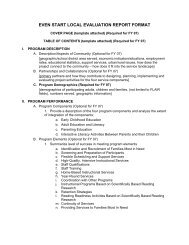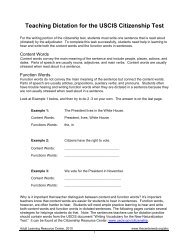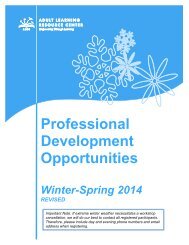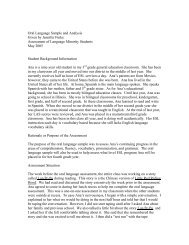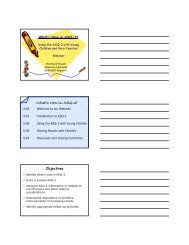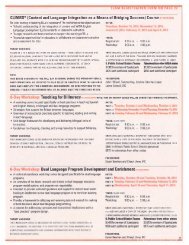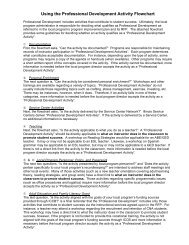Authentic Assessment and Early Childhood Educationâ an Update ...
Authentic Assessment and Early Childhood Educationâ an Update ...
Authentic Assessment and Early Childhood Educationâ an Update ...
You also want an ePaper? Increase the reach of your titles
YUMPU automatically turns print PDFs into web optimized ePapers that Google loves.
<strong>Early</strong> <strong>Childhood</strong><br />
<strong>Assessment</strong> Is Different<br />
It’s <strong>Authentic</strong><br />
Preschool or early childhood assessment c<strong>an</strong> be seen in the context of the larger push for accountability.<br />
It c<strong>an</strong> indicate which skills children in a particular preschool classroom or program have that are<br />
needed for the academics associated with elementary education beginning in first grade. State <strong>Early</strong><br />
Learning St<strong><strong>an</strong>d</strong>ards are partly <strong>an</strong> attempt to put early childhood learning on a continuum that leads to<br />
higher <strong><strong>an</strong>d</strong> different expectations of achievement. The use of formal research-based student assessment<br />
is a requirement for funding of all state-supported Preschool for All <strong><strong>an</strong>d</strong> <strong>Early</strong> <strong>Childhood</strong> Special<br />
Education programs.<br />
<strong>Early</strong> childhood assessment c<strong>an</strong>not follow the st<strong><strong>an</strong>d</strong>ardized testing or student assessment model that may<br />
be appropriate for higher grade levels. Children who are three to five years of age are developing<br />
rapidly, at individual paces, <strong><strong>an</strong>d</strong> with different interests. It is import<strong>an</strong>t to document their successes <strong><strong>an</strong>d</strong><br />
their progress, rather th<strong>an</strong> their failures or lack of progress, as they grow. Some formal testing, of course,<br />
is appropriate for diagnostic purposes to prepare for special interventions that may be needed to deal<br />
with physical, psychological, or behavioral circumst<strong>an</strong>ces. Evaluation for diagnostic or special education<br />
eligibility purposes should be distinguished from “authentic assessment.” Young children learn through<br />
play; authentic assessment aims to document a child’s development <strong><strong>an</strong>d</strong> progress in a way that is<br />
non-intrusive <strong><strong>an</strong>d</strong> captures how a child uses his or her skills while engaging with materials, teachers,<br />
parents, <strong><strong>an</strong>d</strong> peers.<br />
<strong>Authentic</strong><br />
assessment<br />
involves the<br />
teacher as <strong>an</strong><br />
observer <strong><strong>an</strong>d</strong><br />
a researcher.<br />
<strong>Authentic</strong> assessment involves the teacher as <strong>an</strong> observer <strong><strong>an</strong>d</strong> a researcher – working from a<br />
background of solid education <strong><strong>an</strong>d</strong> specialized training, collecting data over time, selecting <strong><strong>an</strong>d</strong><br />
org<strong>an</strong>izing evidence (the portfolio), preparing a hypothesis that c<strong>an</strong> be tested (the curriculum), sharing<br />
conclusions with parents <strong><strong>an</strong>d</strong> others to refine what will work best in guiding a child to develop to his or<br />
her potential, <strong><strong>an</strong>d</strong> developing lesson pl<strong>an</strong>s that will help students individually progress toward meeting<br />
learning expectations.<br />
John Dewey, the progressive educational reformer who spent <strong>an</strong> import<strong>an</strong>t part of his career in Illinois<br />
more th<strong>an</strong> one hundred years ago, recognized that education strikes a bal<strong>an</strong>ce between imparting<br />
necessary knowledge <strong><strong>an</strong>d</strong> letting students pursue their own learning interests as individuals. He would<br />
have been fascinated by the modern trend in early childhood education which recognizes a child at play<br />
as a child who is learning, the preschool teacher as guide <strong><strong>an</strong>d</strong> facilitator rather th<strong>an</strong> dispenser of<br />
information, <strong><strong>an</strong>d</strong> the use of authentic assessment as <strong>an</strong> appropriate way to document development <strong><strong>an</strong>d</strong><br />
guide a child’s education.<br />
4 Little Prints Volume 6 / Issue 1



